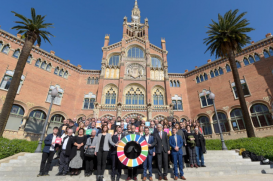ACUP joins Aliança Catalunya 2030, a great country pact to achieve the United Nations Sustainable Development Goals
More than 300 people representing thirty Catalan organisations and entities from different fields have made possible to create Aliança Catalunya 2030, a large coalition of countries to share resources and promote initiatives for 2030 Agenda. Over the following months, Aliança Catalunya 2030 wants to add complicities and new adhesions around the territory, making way for all country’s entities committed to work to achieve the 17 United Nations Sustainable Development Goals. ACUP’s president and rector of Rovira Virgili University, María José Figueras, led the Catalan public universities to join Aliança Catalunya 2030 at a public event held on 21 February at the Sant Pau Art Nouveau Site in Barcelona.
This way, 33 organisations have signed this great country pact to create “a future that leaves no one behind and does not exceed the carrying capacity of nature”, with the aim of “making Catalonia and the world a better place by 2030”, as the signed document states.
Catalan president Quim Torra explained that it is institutions’ responsibility “to give a new opportunity to people and the planet”. For this reason, he assured that “we are and we want to be an active part of the global challenges, of changes that must be undertaken”, and added: “We have a country that is ready and that is on the move to transform Catalonia and improve the world”.
During his speech, Torra highlighted the Government’s desire “to integrate the SDGs into the DNA of political action”, as demonstrated by the fact that “we have prepared and worked on budgets with this vision in mind”. “We will be one of the pioneering governments to have a planning with the 2030 horizon linked to the SDGs”, he said.
For the government’s head, “we have urgent challenges of immense magnitude”, and in this sense he has given as an example the storm Gloria and the floods in Conca del Barberà and other country’s territories; the effect of agricultural products’ low prices and the growth of child poverty, among others. For this reason, Torra wanted to highlight the importance of this Alliance between public and private institutions, third sector, social and economic entities. “The Agenda must help create the conditions for sustainable, inclusive economic growth, shared prosperity and decent work for all”, he said.
Catalan VP and Minister of Economy and Finance Pere Aragonès also took part, stressing that “our commitment is to take action, and we have aligned the Generalitat’s budget with the SDGs in order to move towards a country of shared prosperity. For Aragonès, “the best collective heritage that we can leave to future generations is to make a fairer, more sustainable and more livable world”.
Catalan Minister of Foreign Action, Institutionals Relations and Transparency Alfred Bosch stated that “now is the time for the country to take the lead in 2030 Agenda and the sustainability of the planet”. Bosch reminded us that “we would not be here if it were not for the fact that the Ministers Romeva and Rull initiated this path”. Bosch also defined 2030 Agenda as “a genuine humanist revolution” and warned that failure to comply with it “puts humanity at risk”.
Catalonia’s roadmap to 2030 Agenda
Aliança Catalunya 2030’s presentation began with a speech by the Secretary of Foreign Affairs and the European Union, Mireia Borrell Porta, who stressed that “Catalonia is committed to the global objectives for sustainable development, both the Government and civil society”. Borrell recalled that the Government approved in September the Pla Nacional per a l'Agenda 2030 with more than 900 commitments from all Generalitat’s departments to implement the 17 SDGs in Catalonia.
Consell Asessor per al Desenvolupament Sostenible's (CADS) president, Ramon Coca, explained his organisation’s role at the time of landing the 2030 Agenda in Catalonia and recalled that the Pla Nacional, the Acord nacional and the Aliança 2030 respond to a mandate of the Catalan Parliament. On the other hand, CADS’ director Arnau Queralt has assured that Aliança Catalunya 2030 is “a dynamic alliance of people and organisations, with a lot of potential to take action and its initial core is a guarantee that it will work”.
The event also featured a dialogue moderated by meteorologist Tomàs Molina in which the challenges for a sustainable Catalonia were put on the table, with CADS’ members Alba Cabañas, Carlos Ibáñez and Pep Salas, and the Taula d’Entitats del Tercer Sector Social’s president, Francina Alsina.
The first organisations that have signed the document and therefore joined Aliança Catalunya 2030 are Ajuntament de Barcelona; Associació Catalana d’Universitats Públiques (ACUP); Associació Catalana de Municipis (ACM); Associació per a les Nacions Unides a Espanya (ANUE); Associació Respon.cat; Cercle d'Economia; CIDOB (Barcelona Centre for International Affairs); Comissions Obreres de Catalunya (CCOO Catalunya); Consell Assessor per al Desenvolupament Sostenible; Consell Català de cooperació al desenvolupament; Consell de la Gent Gran; Consell General de Cambres de Catalunya; Consell Interuniversitari de Catalunya (CIC); Consell Nacional de les Dones de Catalunya (CNDC); Consell Nacional dels Infants i els Adolescents de Catalunya; Consell Nacional LGBTI; Consorci de Salut i Social de Catalunya; Creu Roja Catalunya; Dipsalut (Organisme de Salut Pública de la Diputació de Girona); Diputació de Barcelona; Diputació de Girona; Federació de Municipis de Catalunya; Foment del Treball Nacional; Fundesplai; Institut Català Internacional per la Pau; ISGlobal; PIMEC; SciTech DiploHub; Taula d'entitats del Tercer Sector Social de Catalunya; UGT de Catalunya; UNICEF Comitè Catalunya; Xarxa per a la Conservació de la Natura; Xarxa Regional Grups d'Acció Local LEADER de Catalunya.
